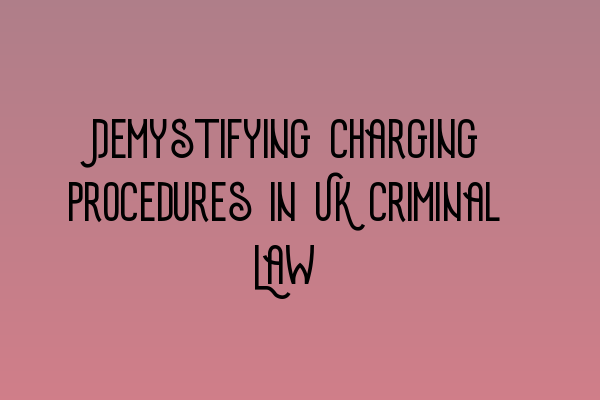Demystifying Charging Procedures in UK Criminal Law
If you’ve found yourself caught up in the intricacies of the UK criminal justice system, you may have heard the term “charging procedures” thrown around. But what exactly does it mean? And how does it affect your case? Don’t worry, we’re here to demystify the process for you.
Understanding the Basics: What are Charging Procedures?
Charging procedures refer to the legal process by which individuals in the UK are formally accused of committing a criminal offense. It is a critical step that ensures those charged with a crime are aware of the specific allegations against them. At this stage, the Crown Prosecution Service (CPS) makes an informed decision on whether there is sufficient evidence to proceed with a prosecution.
Step 1: Investigation
Before charges can be brought, the police conduct a thorough investigation to gather evidence. This may include witness statements, collecting forensic evidence, and analyzing any available CCTV footage. The aim is to build a solid case that can withstand scrutiny in court.
Step 2: Arrest
If the police believe there is enough evidence to support the allegation, they may proceed with an arrest. However, certain situations may allow for voluntary attendance at the police station instead. This part of the charging procedure ensures that the individual is formally notified of the accusation against them.
Step 3: Questioning
Once in custody, the individual will be interviewed by the police. It is crucial to exercise your right to legal representation during this questioning. An experienced criminal defense solicitor can guide you through the process, ensuring your rights are protected.
Step 4: Decision from the Crown Prosecution Service
After the investigation and questioning, the police will submit their case file to the CPS. The CPS will then review all the evidence provided and make a decision on whether to press charges. This decision is based on the strength of the evidence and whether it is in the public interest to prosecute.
Step 5: Charging Decision
If the CPS determines that there is sufficient evidence and it is in the public interest to prosecute, they will formally charge the individual. This is known as an “initial charge” and is usually done by providing a Charge Sheet.
It is important to note that when you are charged with a criminal offense, you are innocent until proven guilty. The legal principle of the burden of proof lies with the Crown, meaning it is their responsibility to prove your guilt beyond a reasonable doubt.
Step 6: First Appearance in Court
Following the charging decision, you will be required to appear before a Magistrates’ Court. This initial court appearance is an opportunity for the charges to be read out and for you to enter a plea (guilty or not guilty). The court will also address any bail or custody arrangements.
Step 7: Case Progression and Trial
If you plead not guilty, the case will progress to trial where the evidence will be presented and contested. The trial stage allows both the prosecution and the defense to scrutinize the evidence and present their respective arguments. The court will ultimately decide whether the defendant is guilty or innocent.
Conclusion: Your Rights and the Criminal Justice System
Navigating the charging procedures in UK criminal law can be complex and overwhelming. That’s why it is crucial to seek professional legal advice if you find yourself facing criminal charges. A skilled solicitor specializing in criminal law will guide you through the process, protect your rights, and vigorously defend your case.
Remember, an accusation is not the same as a conviction. By understanding the charging procedures and seeking expert legal support, you can ensure that you have the best possible chance of a fair outcome and protecting your rights within the UK criminal justice system.
